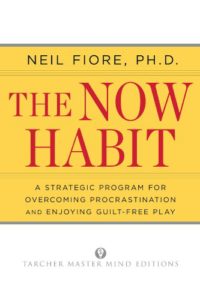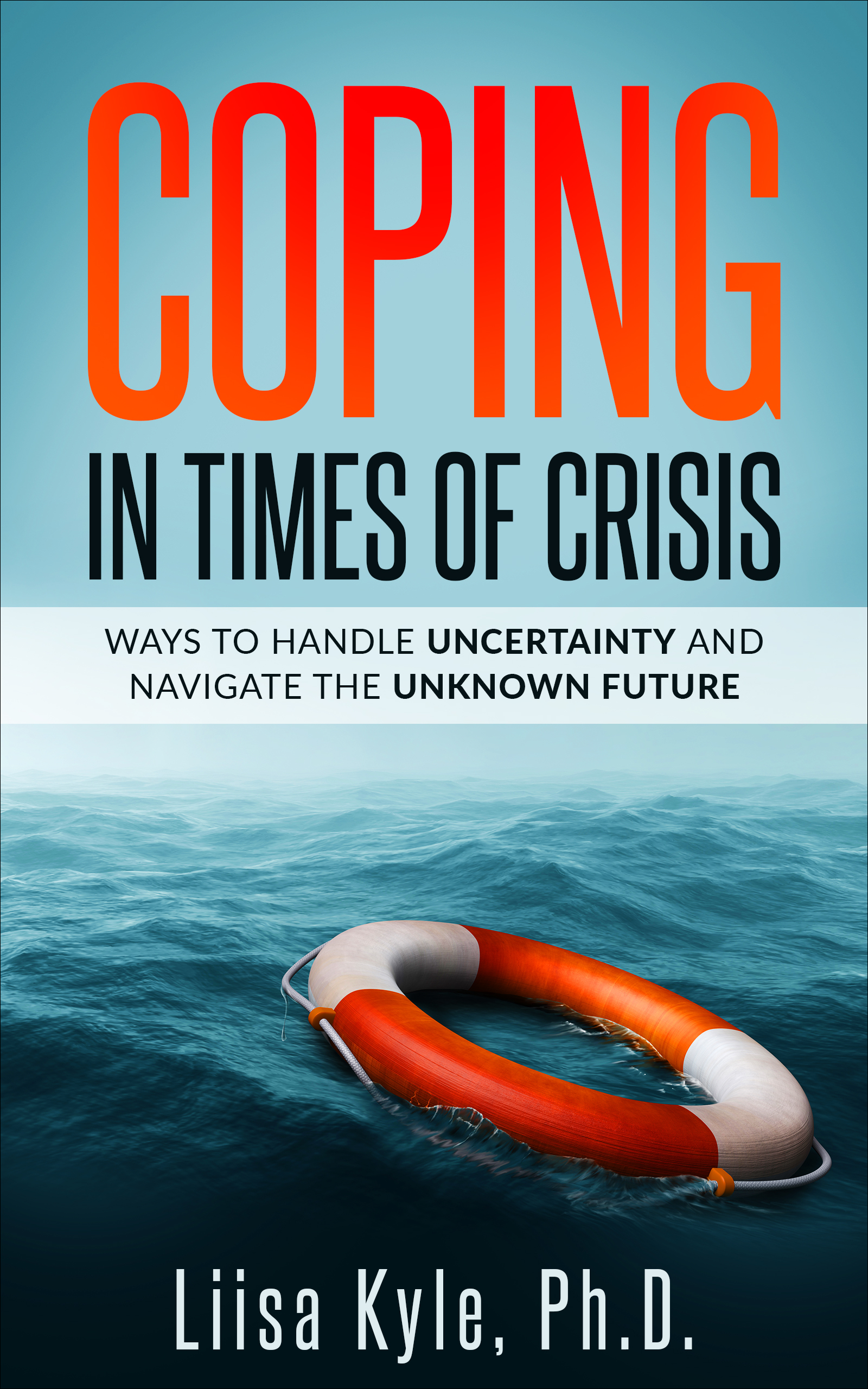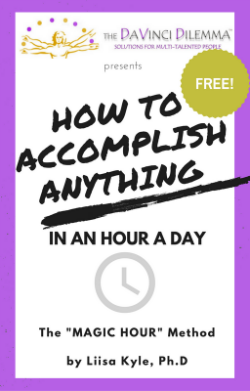 Procrastinators know who we are. First there are the telltale symptoms: the nagging, free-floating guilt like a low-grade infection, the piles of unfinished work, the ever-growing to-do lists. For DaVincis, the effects of procrastination are exponential. Instead of the one doctoral thesis, novel, project or musical instrument you never can seem to get around to, someone with multiple talents may find him or herself dragging around all of these at once.
Procrastinators know who we are. First there are the telltale symptoms: the nagging, free-floating guilt like a low-grade infection, the piles of unfinished work, the ever-growing to-do lists. For DaVincis, the effects of procrastination are exponential. Instead of the one doctoral thesis, novel, project or musical instrument you never can seem to get around to, someone with multiple talents may find him or herself dragging around all of these at once.
The sad thing is that even while we’re avoiding and procrastinating our work and our talents, they’re always on our minds. Even when we are supposed to be having fun or relaxing, we’re thinking of what we “should” be doing right now, and it spoils the moment. But the work still isn’t getting done. (Sound familiar yet?) Plus, now we feel bad about ourselves, which is not such a stretch for many creative types anyway. So the result is a whole lot of pain but no gain. It’s like working out constantly and still ending up with a body that looks like you sat in front of the TV all day eating jelly doughnuts. Sounds like a pretty bad deal to me.
The great thing about procrastination being such a prevalent problem is that there is a lot of help available on the subject. However, some of it is better than others. In my quest to discover the ultimate solution for beating procrastination, I now recommend that every procrastinator, and anyone who wants to get more done with less angst, read The Now Habit by Dr. Neil Fiore.
The Unschedule to the Rescue
There are a number of great things I can say about The Now Habit. First, the compassion and hit-the-nail-on-the-head understanding Dr. Fiore shows to those dealing with procrastination is a huge comfort all by itself. I’ll admit I choked up a little when I read it the first time.
But it’s not all hearts and flowers. In The Now Habit, Dr. Fiore offers some very practical tools. The best and most revolutionary is his time-planning method he calls The Unschedule. At first , it looks a bit like other popular and useful weekly planning methods, such as that found in Steven Covey’s The 7 Habits of highly Effective People ]or David Allen’s Getting Things Done . But the Unschedule turns that traditional GTD thinking upside down. Because in the reverse-psychology of The Unschedule, you’re not even allowed to schedule time for that thing you’ve been procrastinating until you’ve first blocked out time — and a lot of it, including one full day off per week — for Guilt-Free Play.
Fun Comes First
I can hear you blinking at me in confusion. (Yes, your eyelids actually squeak when they move.) I can also hear you thinking, “Guilt-Free Play?! I don’t deserve to play, I only deserve to be chained to my desk with unseen tormentors (who strangely resemble my mother and my second-grade teacher) whipping me until I get my $%^&##! thesis/novel/speech/fill-in-the-blank done!”
But that’s where The Unschedule is genius. We think because we’re so far behind, and we’ve been procrastinating so long, we deserve nothing more than a life of drudgery until the whole project is complete. All Brussels Sprouts and no dessert until your massive plate is clean. But no one wants that life, so we rebel against it and continue to procrastinate. The Unschedule forces you to be good to yourself. You not only get dessert, you get to put it on the menu first. Time with friends, nine holes of golf or a tennis game, a massage, your favorite TV show, Sunday with The New York Times. Wow, this week doesn’t look bad so far.
But surprise! You still don’t schedule in time for your project yet, because The Unschedule says to next put in the time you’ll take for sleep, meals, morning puttering, appointments, errands and stuff you have to do during your day job. Suddenly, you see that rather than “having all week” to work on the project you’ve been procrastinating, you really only have two hours on Monday, an hour on Wednesday, an hour and a half on Thursday, 45 minutes on Friday and half of Saturday.
Any of you who are artists know the concept of negative space, and how working with it makes the object you’re drawing stand out in bold relief, seemingly by magic. With The Unschedule, you’ve filled in all the negative space in your week –everything that is NOT your project –with positive and neutral things. Now the time you have left is clear, well-defined knowable and manageable, and you created it. It’s no longer a potential 24/7 grindstone to be feared, resisted, rebelled against and avoided.
30 Minutes is All it Takes
It gets better. Dr. Fiore suggests that at first you aim for no more than 30 minutes of quality work at a time. “30 minutes?!” you shout. (I have superhero hearing today.) ” I have a 110-page screenplay to write! I can’t get anything important done in 30 minutes!” I would suggest that if you haven’t touched that screenplay in weeks or months, 30 minutes of quality time on it is huge. And you will be amazed (I was) at how much you can get done in 30 minutes when you know that’s all you have to do. You feel terrific afterwards as well, much better than you’d think you had any right to fell after so short a time.
The caveat here is that to “count” as quality work, there must be 100% focus and zero multi-tasking. No phone, no email, no getting up for coffee, no chats with your spouse. I actually found it relaxing the first time I tried it. But it’s not a snap, because I was shocked at how many interruptions, both external (dog-walking, phone-answering, Facebook-updating) and internal (random thoughts, creative tangents, fantasies I won’t go into here) popped up to try to steal my attention just a few minutes in. These gremlins can be stopped, but only if you are ready for them and show them you mean business. If you give in to them before your 30 minutes is up, it doesn’t count and you have to start the clock again. A nice kitchen timer really helps here.
Of course, you can work for more than 30 minutes, and you probably will. You’ve likely discovered that getting started is the hardest part. However, you give yourself credit for every 30-minute increment you do. That can mean a reward like a short coffee break, a chapter of a book or a chat with a friend, or if you are on a roll, you can save up your treats for later.
The best part is, you have your fun stuff to look forward to. Your play time is much more satisfying than before because you chose things you really like, rather than frittering it away on idle web surfing or barely-watchable TV. And now you can really enjoy it because you know you deserve it. Because even if you only do 30 minutes a day on something you’ve been putting off, by Sunday you have produced three quality hours this week on something you may have been procrastinating on for very long time. Trust me, being a producer feels great!
Activity:Pick up The Now Habit. But even if you don’t have the book yet, you can try elements of The Unschedule.
- Get out your planner, calendar or draw a chart where you can see a week at a time with each day broken down into hours.
- Choose and schedule your Guilt-Free Play. Pick out some things you really would enjoy doing this week, such as lunch with a friend, yoga class, seeing that new movie. Block out time for these in your schedule. Also choose one full day that you will take off.
- Block out day-to-day time. Eating, sleeping, morning routines, meetings, that dentist’s appointment — stuff you know you have to do. Be realistic as to how much time these really take. If your last staff meeting went all morning, don’t just allow an hour.
- Ask, “when’s the next time I can start?” In The Now Habit, Dr. Fiore says that ending procrastination isn’t about finishing things, it’s about just getting started over and over. When’s the next time you can start on your project and put in that 30 minutes of quality time?
Try these, and you will be amazed at how you can have more fun and get more done, all in the same 24 hours a day as the rest of us, without the guilt and worry of procrastination.
Are you a champion procrastinator? What has that cost you in terms of your talents and your happiness? Do you have your own tip on beating procrastination? Please share them!
*****
If you’d like to share or publish this article, you may, if you include the author’s name, a link to this original post and the following text blurb:
Are you struggling with too many talents, skills, ideas? You may have The Da Vinci Dilemma™! Find tools, fun quizzes, coaching, inspiration and solutions for multi-talented people at http://www.davincidilemma.com/.




Hi. Where is the downloadable weekly unschedule page that you referred to in the ebook? I don’t see it here. Thanks.
I believe that is in The Now Habit book and on Neil Fiore’s website. Google “The unschedule” and it should come up.
Sorry for any confusion!
Lisa